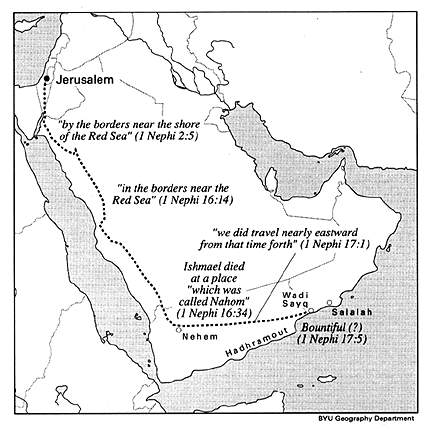
(Click to enlarge.)
A couple of quick comments, today, on 1 Nephi 18:
1.
If one grants Hugh Nibley’s view that Lehi had a background in caravan trade, the names of his children may almost mark out his life’s story.
Laman and Lemuel, his two eldest sons, bear names that seem to come from the northwestern part of the Arabian Peninsula. Laman, for example, is Semitic, but not Hebrew. Lihyanite was a language that was spoken in that area around 500 BC or so, and Laman has been found in a Lihyanite inscription. The name Lemuel occurs in Proverbs 31:1 and 31:4, where it’s given to the “King of Massa” (perhaps connected with an Arabian tribe known in Greek as the Masenoi, who lived, again, in the northwestern portion of Arabia. (See here.)
So Laman and Lemuel may reflect Lehi’s early days as a caravan merchant.
The names Sam and Nephi, though, seem to reflect the days of his prosperity.
Sam may come during a time of transition. Hugh Nibley saw it as Egyptian (as in the royal title sam-tawi, “uniter of the two lands”), and there is also, potentially, a plain Semitic source for it. (On the latter, see here.)
In the very first verse of the Book of Mormon, Nephi comments on the excellent education that he had received, thanks to his “goodly parents.” It was an education that included elements of Egyptian. So it’s not surprising that his name, too, is Egyptian. (On Nephi, see here and here.)
With Jacob and Joseph, however, whose birth is first mentioned in this chapter (1 Nephi 18:7), the family is now living in tents out in the desert in the manner of the first Hebrew patriarchs (Abraham, Isaac, and Jacob, and Jacob’s son Joseph). Not coincidentally, Lehi’s naming preferences have now turned toward the simple days of the spiritual and literal founders of his people.

2.
The “rudeness” of 1 Nephi 18:9 should not be confused with merely being impolite, though impoliteness was surely on display, too.
The Latin rudis, from which Middle English took the word rude (via Old French), was a term in handicrafts that meant something like “unwrought” or “unfinished.” (The word rudus referred to broken stone.) It came to be used figuratively to indicate a lack of “cultivation” or “breeding” or, yes, “good manners.” (Think of a “finishing school.” “Rude people” clearly hadn’t been to one. Or, if they had, it had been wasted on them.)
Older English speakers could refer to a “rude cottage” — one that was roughly built, not one that was somehow impolite. Perhaps our word crude — from the Latin crudus (“raw” or “rough”) — does the trick here. (Think of crudeness.)











